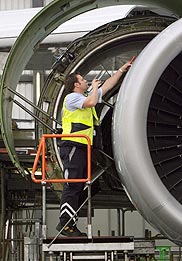
 |
Since 1995, Boeing has offered operators a human factors tool called the Maintenance Error Decision Aid (MEDA) for investigating contributing factors to maintenance errors. Boeing has recently expanded the scope of this tool to include not only maintenance errors but also violations in company policies, processes, and procedures that lead to an unwanted outcome. |
| THE MEDA PROCESS IS THE WORLDWIDE STANDARD FOR MAINTENANCE ERROR INVESTIGATION. | by William Rankin, Ph.D., Boeing Technical Fellow, Maintenance Human Factors |
Boeing, along with industry partners, began developing MEDA in 1992 as a way to better understand the maintenance problems experienced by airline customers. A draft tool was developed and nine airline maintenance organizations tested the usefulness and usability of the tool in 1994 and 1995. Based on the results of this test, the tool was improved. In 1995, Boeing decided to offer MEDA to all of its airline customers as part of its continued commitment to safety. Since that time, the MEDA process has become the worldwide standard for maintenance error investigation.
MEDA is a structured process for investigating the causes of errors made by maintenance technicians and inspectors. It is an organization's means to learn from its mistakes. Errors are a result of contributing factors in the workplace, most of which are under management control. Therefore, improvements can be made to the workplace to eliminate or minimize these factors so they do not lead to future events.
Boeing has recently updated the MEDA tool to reflect the latest thinking about maintenance event investigations. This article addresses the following:
- The effect of reducing maintenance errors.
- An overview of the MEDA process.
- The MEDA philosophy.
- Why MEDA has shifted to an event investigation process rather than just an error investigation process.
- Considering violations during an event investigation.
- How errors and violations often occur together to produce an unwanted outcome.
- How addressing the contributing factors to lower-level events can prevent more serious events.
